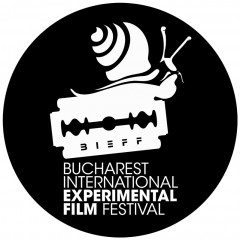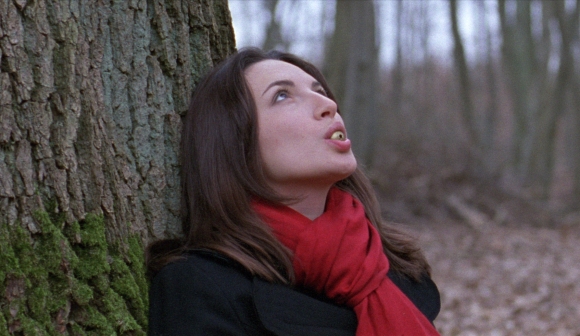THE RECALL OF THE SONGBIRD portrays a woman who travels through her memories – while seeing herself again as a child hunting with her father, she relives the terror of the gun shots and the desire to be accepted despite the fact that she was not a boy. For the first time she also sees her father with different eyes, understanding his loneliness and weakness. ROSSELLA PICCINNO earned a degree in documentary and experimental filmmaking from the DAMS, Bologna. From 2009 to 2011 she was resident artist at LE FRESNOY where she got a degree in “Cinema and Digital Arts”.
Ioana Mischie: THE RECALL OF THE SONGBIRD is a film who talks about families, of the difficulty of growing up with the expectations and disappointment of expectations. How did you develop this initial idea and why did you choose this personal title?
Rossella Piccinno: This project was based on an idea for a split-screen video installation using archive images with the title “The Nuclear Family.” I wanted to create something ironic and explosive which would bombard the viewers, putting the accent on the clichés with which the media, the state and religions manipulate the concept of the family. I also wanted to denounce domestic violence and the family as the first power system to impose itself on individual liberty. I still think this is an interesting project but it is evident that in realizing “The Recall of the Songbird” I have in the end given voice to other instances. I remember that in developing this idea I did at a certain moment ask myself the questions: “Why did I want to get involved with this theme? What was personal to me in such a general subject? What is my direct conflict with the family? What has so deeply wounded me?” With these questions I began to look deeply into my past, like the main character in the film as she traces her own childhood. Swept by a wave of undefined emotions I sought equilibrium in disciplined writing and I chose to film using super 16mm with a very sober style. I transferred my lived experiences from southern Italy to the North of France to give this recalling an autonomous status and to seek to make it universal. Above all, I discovered that before I could express my subversive load I needed to cure the pain. THE RECALL OF THE SONGBIRD is an initiatory inner voyage towards reconciliation with my childhood memories. I chose this title in English because I was interested in focusing on the theme of the search for memories and on the sound which is produced by hunters to call birds, all the whistles used by my father to simulate the notes of the birds made an impression on me.
Ioana Mischie: How did you work with the actors and how challenging was during the shooting and in the editing room to create the same time and space from two different emotional “epoques”?
Rossella Piccinno: The work with the actors was intense. I didn’t wish it to be only recitation, or simply simulating a role. I believe a lot in the importance of the creative process, working more for the ‘process’ than for the results. For me this film was a sort of psycho-magic gesture, a kind of interior therapy that I also wished to share with the cast in order to use the film as a catalyst in the life of everyone. For this motive I chose for the role of the father and the girl a real father and daughter, and I preferred to choose as actress a woman who had, like me, a strong conflict with her father. This created between myself and the actors a strong transfer which was not always easy to manage, and in the case of the actress led to conflict between us because she could not find inside herself the way between anger and reconciliation on which we were working. I had to change something in the editing because of this but with regard to the question of the same time and space for two different emotional epochs I didn’t have too much problem. It was a sort of vision that was clear inside me from the outset, like something natural.
Ioana Mischie: Revisiting the concept of flashback, as we know it from Ingmar’s Bergman’s WILD STRAWBERRIES or Borges’ THE OTHER, this short film innovatively gathers past and present in the same frame. Memories have the over-natural power that allows them to become concrete reality as the woman meets her 20 years younger self. What motivated you to choose this original type of approaching the flashback technique?
Rossella Piccinno: For many years I have sought to train myself to a strong dialogue with that part of me which we can call “profound nature” or “inner voice.” I do this through reading widely and through practices ranging from core energy to the ‘process work’ of deep democracy. Often to talk to my weakest and most fragile self I visualize myself as a child and I speak to her directly as if she was there, next to me. That is what I did in the film, being the witness of a painful moment alongside her, sharing the pain with her, touching her to give her my energy as an adult and aware woman.
Ioana Mischie: An innovatively beautiful chronology, in which time becomes a mirror of our inner events. But do you perceive time as well as a therapy for ourselves, for our dreams, aims, hopes, fears?
Rossella Piccinno: I believe strongly in the power of projection that our thought has. I think I also love cinema because it is a privileged instrument for the creation and realization of our projections. Certainly we can use time to project not only our repressed experience but also our desires, dreams, aims, hopes and fears. We can project all this in our future and our present, and we can also create false memories if we wish, if we feel we have the need. We can do all this in daily life with our fantasy, speak to ourselves, console and strengthen, but we can also do it through cinema. Personally I feel that the fact that I have been given this possibility is absolutely extraordinary.
Ioana Mischie: You graduated documentary and experimental filmmaking from the DAMS, Bologna. What is your approach towards experimental filmmaking? What motivates you to explore life through experimental films and what filmmaking experiments are you planning?
Rosella Piccinno: It is only recently that I am maturing an ‘aware’ approach to experimental film-making. When I was at university I had an immediate attraction to it, an instinctive call, and since I have worked a lot and officially on documentaries while in parallel making experimental films that I considered private and that have for the most part remained unpublished. For a long time I kept the two things apart. The two years I spent at “Le Fresnoy, Studio National des Arts Contemporains”, were extremely important for beginning to ask myself questions about the mode and motives of my expression. I passed my diploma a year ago and ever since it has been like starting all over again. I must say this has been incredible. I am now in a moment of creative explosion: it is wonderful, extremely intense and sometimes very tiring. I can finally see all the threads that link even the most diverse aspects of my work and I feel I have a great number of ways and possibilities to explore and develop. I feel much more open and richer than before. I have an approach that is effectively more ample, including electronic art as well as cinema, and at last I feel that I can unite my documentary approach to experimental cinema without any problem. Returning to what I said before with regard to the importance of the ‘process’ and ‘projection’, in April I went to Iceland to make a performance film about myself while seeking to reactivate in myself and in other women I met there the archetype of a 10th century Icelandic prophetess. It will be a very personal feminine and feminist film in which documentary, fiction and performance mix, and I hope to begin post-production very soon. In the meantime I have made an experimental documentary on two screens in a suburb classified among the 25 most sensitive areas of France, putting into the scene the people of the ‘quartier’ and their real life. I have a project for a film to make in Bucharest with two activists I met here during an artists’ residence in March. I am also planning to make a film to mix live with two electronic musicians who will compose and play the music specially. We have just begun to collaborate on this. In short, many works are in progress, and many others will come to light thanks to research, collaboration with other artists and thanks to the courage and wish to dare and embark on new directions. I am a traveller and it is this approach that I have with experimental cinema.
More about THE RECALL OF THE SONGBIRD.


Pingback: THE RECALL OF THE SONGBIRD – Interview with Rossella Piccinno « in the meantime